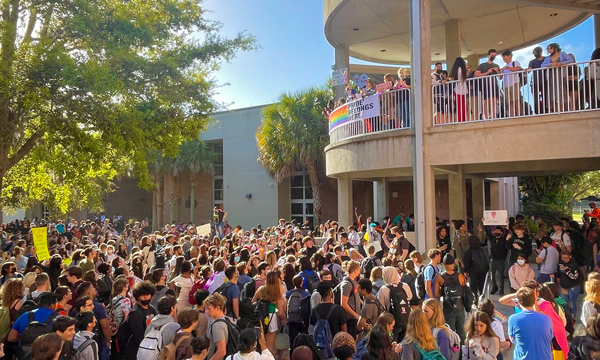Angry at DeSantis, Fla. Students Take to the Streets — and Take a Banned Lesson
'A Culture of Fear': Thousands of Florida youth walk out of classes to protest newly expanded ‘Don’t Say Gay’ rules and other in-school speech bans

Get stories like this delivered straight to your inbox. Sign up for The 74 Newsletter
On April 21, thousands of students throughout Florida walked out of their classrooms to protest Gov. Ron DeSantis’ education policies. Coming, coincidentally, two days after the state Board of Education approved expanding his “Don’t Say Gay” law through 12th grade, the demonstration encompassed at least 300 high schools and 90% of the state’s colleges — including all of its Historically Black Colleges and Universities — according to the youth-led group Walkout 2 Learn.
“It was an incredibly powerful moment,” says Zander Moricz, a recent Florida high school graduate who was a plaintiff in a suit challenging the law. “We had thousands of students sign a pledge to vote and take a banned history lesson.”
The law, passed by the Florida Legislature last year, had outlawed classroom discussion of sexual orientation and gender identity in grades K-3 and required that any instruction in upper grades be “age-appropriate.” The recent extension to a wholesale ban in all grades was among a slate of resolutions passed by the board at the governor’s behest. It cannot go into effect until after a 30-day “procedural notification” period.
This was not the first time DeSantis has implemented measures targeting LGBTQ Floridians and people of color rather than wait for the legislature to act. Earlier this year, he directed the Florida Boards of Medicine and Osteopathic Medicine to ban gender-affirming health care for trans youth — a move the legislature is now deliberating enshrining in law.
DeSantis, widely believed to be laying the groundwork for a 2024 presidential bid, has said his election to the governorship proves he has a mandate to make unilateral policy decisions, which lawmakers can later affirm or — highly unlikely in a GOP-dominated state — overturn. Similar use of executive power by governors and attorneys general is taking place in numerous states.
He has also restricted instruction on topics involving race, outlawed Advanced Placement African American history classes and announced plans to rid Florida colleges and universities of diversity efforts and instruction involving critical race theory.
While DeSantis and his backers had said the ban on early-grades discussions of LGBTQ topics was needed to protect young children from inappropriate materials, state officials said last week’s extension to all students was necessary to ensure that teachers do not stray from instruction that meets state academic standards.
The protests, which were followed in some places by community rallies, had a twofold purpose, says Moricz, now a 19-year-old freshman at Harvard University. Young people, he says, needed to feel the power in taking action to defend free speech, while sending a message to elected officials that youth are watching — and planning to vote.
“There is a culture of fear in Florida schools right now, and it’s hard for students to shake,” he says. “Florida’s legislature is not listening to parents, teachers and students. This legislature is listening to Florida’s governor.”
Students joining the noon walkout participated in 20 minutes of organized activities, including a five-minute version of a Black history lesson banned by DeSantis. The focus: censorship of historical Black and LGBTQ figures. Protesters also registered to vote and wrote letters to school board members and other officials promising to work to elect candidates who support students’ rights.
Making sure the student demonstrators could realize immediate and tangible outcomes — like taking the voting pledge and having the opportunity to enroll in an online, college-level Black history class created by Harvard faculty who had helped to develop the banned AP course — was important to giving them a sense of their potential power, says Moricz.
“Young people in Florida are taking back the state strategically and intentionally,” he says, “and we’re protecting each other in the process.”
Moricz, a founder of the 2,000-member Social Equity Through Education Alliance, gained instant acclaim a year ago, when he was warned not to say gay in his commencement address at Pine View School for the Gifted in Osprey, Florida.
Told his mic would be cut if he mentioned his role as plaintiff, Moricz, who is gay, gave a speech about coming out as curly-haired.
“I used to hate my curls,” he said, doffing his mortarboard. “I spent mornings and nights embarrassed of them, trying desperately to straighten this part of who I am.
“But the daily damage of trying to fix myself became too much to endure. So, while having curly hair in Florida is difficult — due to the humidity — I decided to be proud of who I was and started coming to school as my authentic self.”
After the speech went viral, Moricz was invited to appear on Good Morning America.
Walkout 2 Learn tapped a number of youth-friendly technologies to organize students throughout the state. Participants were texted instructions on the day of the protest, for example, and will be kept up to date on the group’s work via a Slack channel. Those who independently complete the online Black history class will earn a certification to put on college applications.
“Don’t worry,” its website advises, “if your school threatens to punish you, we have lawyers and politicians who will support you.”
Get stories like these delivered straight to your inbox. Sign up for The 74 Newsletter

;)
